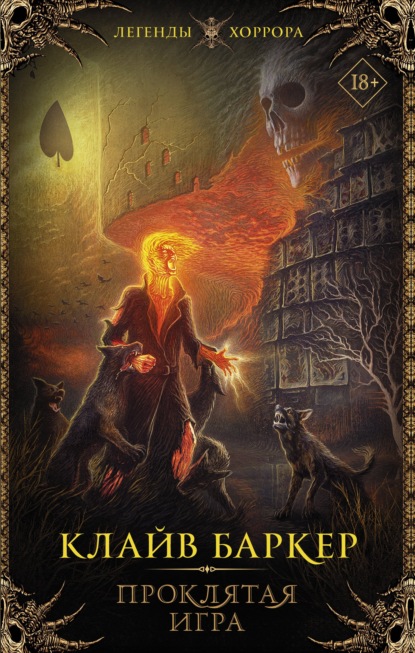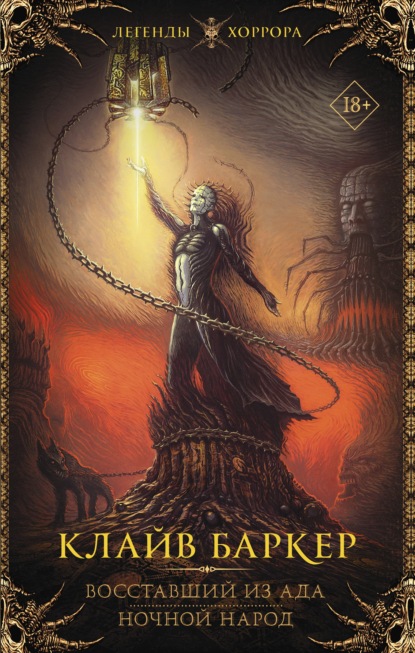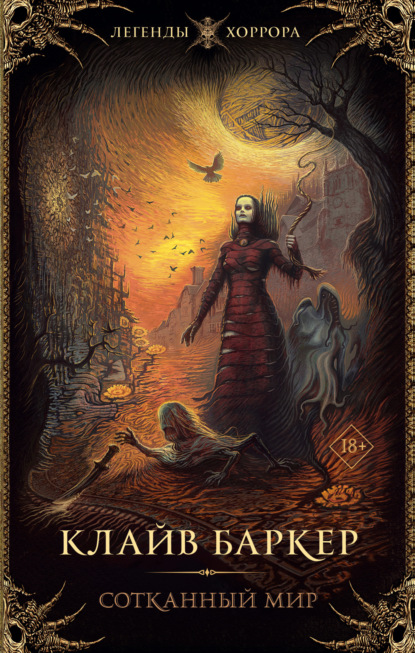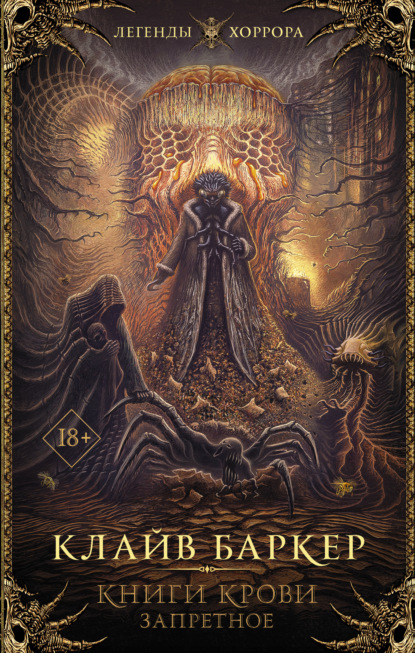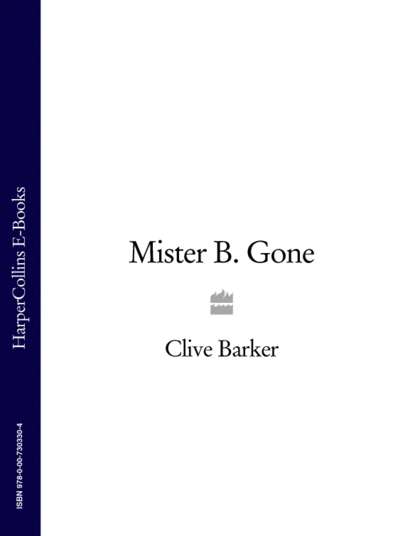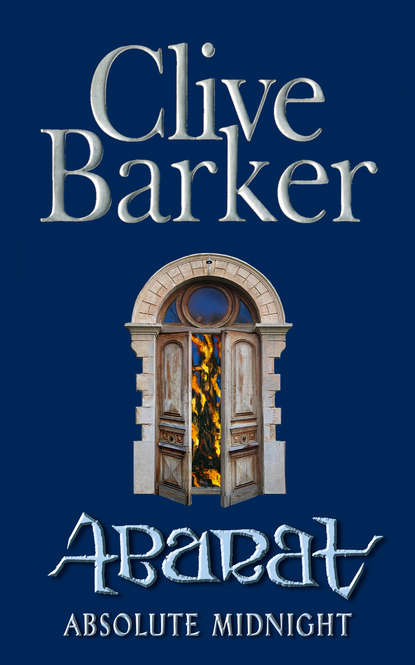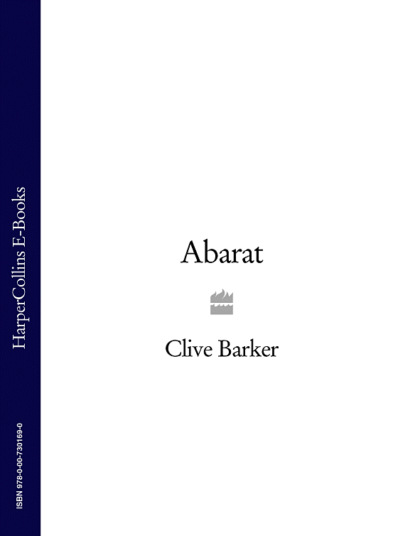
Полная версия
Abarat

CLIVE BARKER
Abarat


Copyright
HarperVoyager An imprint of HarperCollinsPublishers Ltd. 1 London Bridge Street London SE1 9GF
www.harpercollins.co.uk
First published in 2002
Copyright © 2002 by Clive Barker
Clive Barker asserts the moral right to be identified as the author of this work
A catalogue record for this book is available from the British Library
All rights reserved under International and Pan-American Copyright Conventions. By payment of the required fees, you have been granted the non-exclusive, non-transferable right to access and read the text of this ebook on-screen. No part of this text may be reproduced, transmitted, down-loaded, decompiled, reverse engineered, or stored in or introduced into any information storage and retrieval system, in any form or by any means, whether electronic or mechanical, now known or hereinafter invented, without the express written permission of HarperCollins ebooks
HarperCollinsPublishers has made every reasonable effort to ensure that any picture content and written content in this ebook has been included or removed in accordance with the contractual and technological constraints in operation at the time of publication
Source ISBN: 9780006513704
Ebook Edition © JANUARY 2009 ISBN: 9780007301690
Version: 2017-11-02
PRAISE FOR CLIVE BARKER AND ABARAT
“Above all, this is a deeply lovely catalogue of the strange. Islands carved into colossal heads, giant moths made of coloured ether, words that turn into aeroplanes, tentacled maggot-monsters: they dance past like a carnival, a true surrender to the weird.”
Guardian
“Always creating and always pushing into the farthest reaches of the human mind, [Barker] is an artist in every sense of the word. He is the great imaginer of our time.”
QUENTIN TARANTINO
“Clive Barker is a magician of the first order”
New York Daily News
“Keeps you effortlessly turning the pages”
New York Times Magazine
“A blend of Alice in Wonderland and The Lion, The Witch and the Wardrobe”
Entertainment Weekly
“Clever, but oh so creepy”
People
To Emilian David Armstrong
I dreamed a limitless book,
A book unbound,
Its leaves scattered in fantastic abundance.
On every line there was a new horizon drawn,
New heavens supposed;
New states, new souls.
One of those souls,
Dozing through some imagined afternoon,
Dreamed these words.
And needing a hand to set them down,
Made mine.
C. B.
CONTENTS
Title Page
Copyright
Praise
Epigraph
PROLOGUE: THE MISSION
PART ONE: MORNINGTIDE
1. Room Nineteen;
2. What Henry Murkitt Left Behind;
3. Doodle;
4. “Street Ends”
5. A Shore Without a Sea
6. The Lady Ascends
7. Light and Water
8. A Moment with Melissa
9. Events on the Jetty
PART TWO: TWILIGHT AND BEYOND
10. The Waters 97
11. The Card Players
12. A Talk on the Tide
13. In The Great Head
14. Carrion
PART THREE: WHERE IS WHEN?
15. Bug 153
16. The Universal Eye
17. Almenak
18. The Tale of Hark’s Harbor
19. On Vesper’s Rock
20. The World Through Borrowed Eyes
21. The Hunt
PART FOUR: WICKED STRANGE
22. In Gallows Forest
23. The Man Who Made the Kid
24. Digger and Dragons
25. Mischief Undone
26. The House of Lies
27. Words with the Criss-Cross Man
28. A Slave’s Soul
29. Cat’s Eyes
30. “Come Thou Glyph to Me”
31. The Twenty-Fifth Hour
32. Monsoon
33. All Things in Time
34. Different Destinies
Keep Reading
Appendix: Some Excerpts From Klepp’s Almenak
Excerpt
Prologue
PART ONE: Freaks, Fools And Fujitives
Chapter One: Portriat Of Girl And Geshrat
About the Author
Also By Clive Barker
About the Publisher
PROLOGUE
THE MISSION
Three is the number of those who do holy work; Two is the number of those who do lover’s work; One is the number of those who do perfect evil Or perfect good.
—From the notes of a monk
of the Order of St. Oco;
his name unknown
THE STORM CAME UP out of the southwest like a fiend, stalking its prey on legs of lightning.
The wind it brought with it was as foul as the devil’s own breath and it stirred up the peaceful waters of the sea. By the time the little red boat that the three women had chosen for their perilous voyage had emerged from the shelter of the islands, and was out in the open waters, the waves were as steep as cliffs, twenty-five, thirty feet tall.
“Somebody sent this storm,” said Joephi, who was doing her best to steer the boat, which was called The Lyre. The sail shook like a leaf in a tempest, swinging back and forth wildly, nearly impossible to hold down. “I swear, Diamanda, this is no natural storm!”
Diamanda, the oldest of the three women, sat in the center of the tiny vessel with her dark blue robes gathered around her and their precious cargo pressed to her bosom.
“Let’s not get hysterical,” she told Joephi and Mespa. She wiped a long piece of white hair out of her eyes. “Nobody saw us leave the Palace of Bowers. We escaped unseen, I’m certain of it.”
“So why this storm?” said Mespa, who was a black woman, renowned for her resilience, but who now looked close to being washed away by the rain beating down on the women’s heads.
“Why are you so surprised that the heavens complain?” Diamanda said. “Didn’t we know the world would be turned upside down by what just happened?”
Joephi fought with the sail, cursing it.
“Indeed, isn’t this the way it should be?” Diamanda went on. “Isn’t it right that the sky is torn to tatters and the sea put in a frenzy? Would we prefer it if the world did not care?”
“No, no of course not,” said Mespa, holding on to the edge of the pitching boat, her face as white as her close-cropped hair was black. “I just wish we weren’t out in the middle of it all.”
“Well, we are!” said the old woman. “And there’s not a thing any of us can do about it. So I suggest you finish emptying your stomach, Mespa—”
“It is empty,” the sick woman said. “I have nothing left to bring up.”
“—and you Joephi, handle the sail—”
“Oh, Goddesses …” Joephi murmured. “Look.”
“What is it?” said Diamanda.
Joephi pointed up into the sky.
Several stars had been shaken down from the fir-mament—great white cobs of fire piercing the clouds and falling seaward. One of them was heading directly toward The Lyre.
“Down!” Joephi yelled, catching hold of the back of Diamanda’s robes and pushing the old woman off her seat.
Diamanda hated to be touched; manhandling, she called it. She started to berate Joephi roundly for what she’d done, but she was drowned out by the roaring sound of the falling star as it rushed toward the vessel. It burst the billowing sail of The Lyre, burning a hole right through the canvas, and then plunged into the sea, where it was extinguished with a great hissing sound.
“I swear that was meant for us,” Mespa said when they had all raised their heads from the boards. She helped Diamanda to her feet.
“All right,” the old lady replied, yelling over the din of the seething waters, “that was closer than I would have liked.”
“So you think we are targets?”
“I don’t know and I don’t care,” Diamanda said. “We just have to trust to the holiness of our mission.”
Mespa licked her pale lips before she chanced her next words.
“Are we sure it’s holy?” she said. “Perhaps what we’re doing is sacrilegious. Perhaps she should be left to—”
“Rest in peace?” said Joephi.
“Yes,” Mespa replied.
“She was barely more than a girl, Mespa,” Joephi said. “She had a life of perfect love ahead of her, and it was stolen.”
“Joephi’s right,” said Diamanda. “Do you think a soul like hers would sleep quietly, with so much life left to live? So many dreams that she never saw come true?”
Mespa nodded. “You’re right, of course,” she conceded. “We must do this work, whatever the cost.”
The thunderhead that had followed them from the islands was now directly overhead. It threw down a vile, icy rain, thick as phlegm, which struck the boards of The Lyre like drumming. The lightning came down around the trembling vessel on every side, its lurid light throwing the curling waves into silhouette as they rose to break over the boat.
“The sail’s no use to us now,” said Joephi, looking up at the tattered canvas.
“Then we must find other means,” said Diamanda. “Mespa. Take hold of our cargo for a few moments. And be careful.”
With great reverence Mespa took the small box, its sides and lid decorated with the closely etched lines of talismans. Relieved of her burden, Diamanda walked down to the stern of The lyre, the pitching of the boat threatening several times to throw her over the side before she reached the safety of the little seat. There she knelt and leaned forward, plunging her arthritic hands into the icy waters.
“You’d best be careful,” Mespa warned her. “There’s a fifty-foot mantizac that’s been following us for the last half hour. I saw it when I was throwing up.”
“No self-respecting fish is going to want my old bones,” Diamanda said.
She’d no sooner spoken than the mottled head of a mantizac—not quite the size Mespa had described, but still huge—broke the surface. Its vast maw gaped not more than a foot from Diamanda’s outstretched arms.
“Goddess!” the old lady yelled, withdrawing her hands and sitting up sharply.
The frustrated fish pushed against the back of the boat, as if to nudge one of the human morsels on board into its own element.
“So …” said Diamanda. “I think this calls for some moon-magic.”
“Wait,” said Joephi. “You said if we used magic, we would risk drawing attention to ourselves.”
“So I did,” Diamanda replied. “But in our present state we risk drowning or being eaten by that thing.” The mantizac was now moving up the side of The Lyre, turning up its enormous head and fixing the women with its silver-and-scarlet eye.
Mespa clutched the little box even closer to her bosom. “It won’t take me,” she said, a profound terror in her voice.
“No,” said Diamanda reassuringly. “It won’t.”
She raised her aged hands. Dark threads of energy moved through her veins and leaped from her fingertips, forming delicate shapes on the air, and then fled heavenward.
“Lady Moon,” she called. “You know we would not call on you unless we needed your intervention. So we do. Lady, we three are of no consequence. We ask this boon not for ourselves but for the soul of one who was taken from among us before she was ready to leave. Please, Lady, bear us all safely through this storm, so that her life may find continuance …”
“Name our destination!” Joephi yelled over the roar of the water.
“She knows our minds,” Diamanda said.
“Even so,” Joephi replied. “Name it!”
Diamanda glanced back at her companion, faintly irritated. “If you insist,” she said. Then, reaching toward the sky again, she said: “Take us to the Hereafter.”
“Good,” said Joephi.
“Lady, hear us—” Diamanda started to say.
But she was interrupted by Mespa.
“She heard, Diamanda.”
“What?”
“She heard.”
The three women looked up. The roiling storm clouds were parting, as though pressed aside by titanic hands. Through the widening slit there came a shaft of moonlight: the purest white, yet somehow warm. It illuminated the trough between the waves where the women’s boat was buried. It covered the vessel from end to end with light.
“Thank you, Lady …” Diamanda murmured.
The moonlight was moving over the boat, searching out every part of the tiny vessel, even to the shadowy keel that lay beneath the water. It blessed every nail and board from prow to stern, every grommet, every oar, every pivot, every fleck of paint, every inch of rope.
It touched the women too, inspiring fresh life in their weary bones and warming their icy skin.
All of this took perhaps ten seconds.
Then the clouds began to close again, cutting the moonlight off. Just as abruptly as it had begun, the blessing was over.
The sea seemed doubly dark when the light had passed away, the wind keener. But the timbers of the boat had acquired a subtle luminescence from the appearance of the moon, and they were stronger for the benediction they had received. The boat no longer creaked when it was broad-sided. Instead it seemed to rise effortlessly up the steep sides of the waves.
“That’s better,” said Diamanda.
She reached out to reclaim their precious cargo.
“I can take care of it,” Mespa protested.
“I’m sure you can,” said Diamanda. “But the responsibility lies with me. I know the world we’re going to, remember? You don’t.”
“You remember the way it was,” Joephi reminded her. “But it will have changed.”
“Very possibly,” Diamanda agreed. “But I still have a better idea of what lies ahead of us than you two do. Now give me the box, Mespa.”
Mespa handed the treasure over, and the women’s vessel carved its way through the lightless sea, picking up speed as it went, the bow lifting a little way above the waters.
The rain continued to beat down on the women’s heads, gathering in the bottom of the boat until it was four inches deep. But the voyagers took no notice of its assault. They simply sat together in grateful silence, as the magic of the moon hurried them toward their destination.
“There!” said Joephi. She pointed off toward the distant shore. “I see the Hereafter.”
“I see it too!” said Mespa. “Oh, thank the Goddess! I see it! I see it!”
“Hush yourselves,” Diamanda said. “We don’t want to draw attention.”
“It looks empty,” Joephi said, scanning the landscape ahead. “You said there was a town.”
“There is a town. But it’s a little distance from the harbor.”
“I see no harbor.”
“Well, there’s not much of it left,” Diamanda said. “It was burned down, long before my time.”
The keel of The Lyre was grating on the shore of the Hereafter. Joephi was first out, hauling on the rope and securing it to a piece of aged timber that was driven into the ground. Mespa helped Diamanda out, and the three of them stood side by side assessing the unpromising landscape spread before them. The storm had followed them across the divide between the two worlds, its fury undimmed.
“Now, let’s remember,” said Diamanda, “we’re here to do one thing and one thing only. We get our business done and then we leave. Remember: we should not be here.”
“We know that,” said Mespa.
“But let’s not be hasty and make a mistake,” Joephi said, glancing at the box Diamanda carried. “For her sake we have to do this right. We carry the hopes of the Abarat with us.”
Even Diamanda was quieted by this remark. She seemed to meditate on it for a long moment, her head downturned, the rain washing her white hair into curtains that framed the box she held. Then she said: “Are you both ready?”
The other women murmured that yes, they were; and with Diamanda leading the way, they left the shore and headed through the rain-lashed grass, to find the place where providence had arranged they would do their holy work.
PART ONE
MORNINGTIDE
Life is short, And pleasures few, And holed the ship, And drowned the crew, But o! But o! How very blue The sea is!
—The last poem written by
Righteous Bandy, the
nomad Poet of Abarat
1
ROOM NINETEEN
THE PROJECT MISS SCHWARTZ had set for Candy’s class was simple enough. Everyone had a week to bring into school ten interesting facts about the town in which they all lived. Something about the history of Chickentown would be fine, she said, or, if students preferred, facts about the way the town was today, which meant, of course, the same old stuff about chicken farming in modern Minnesota.
Candy had done her best. She’d visited the school library and scoured its shelves for something, anything, about the town that to her sounded vaguely interesting. There was nothing. Nada, zero, zip. There was a library on Naughton Street that was ten times the size of the school library; so she went there. Again, she scanned the shelves. There were a few books about Minnesota that mentioned the town, but the same boring facts were repeated in volume after volume. Chickentown had a population of 36,793 and it was the biggest producer of chicken meat in the state. One of the books, having mentioned the chickens, described the town as “otherwise undistinguished.”
Perfect, Candy thought. I live in a town that is otherwise undistinguished. Well, that was Fact Number One. She needed only nine more.
“We live in the most boring town in the country,” she complained to her mother, Melissa, when she returned home. “I can’t find anything worth writing about for Miss Schwartz.”
Melissa Quackenbush was in the kitchen, making meatloaf. The kitchen door was closed, so as not to disturb Candy’s father, Bill. He was in a beer-induced slumber in front of the television, and Candy’s mother wanted to keep it that way. The longer he stayed unconscious, the easier it was for everyone in the house—including Candy’s brothers, Don and Ricky—to get on with their lives. Nobody ever mentioned this aloud. It was a silent understanding between the members of the household. Life was more pleasant for everyone when Bill Quackenbush was asleep.
“Why do you say it’s boring?” Melissa asked, as she seasoned the meatloaf.
“Just take a look out there,” Candy said.
Melissa didn’t bother, but that was only because she knew the scene outside the window all too well. Beyond the grimy glass was the family’s chaotic backyard: the shin-high grass browned by the heat wave that had come unexpectedly in the middle of May, the inflatable pool they’d bought the previous summer and had never deflated and stowed away, now a dirty circle of red-and-white plastic at the far end of the yard. Beyond the collapsed pool was the broken fence. And beyond the fence? Another yard in not much better shape, and another, and another, until eventually the yards ended, and the streets too, and the empty grasslands began.
“I know what you want for your project,” she said.
“Oh?” said Candy, going to the fridge and taking out a soda. “What do I want?”
“You want something weird,” Melissa said, putting the meat into the baking tin and thumbing it down. “You’ve got a little morbid streak in you, just like your grandma Frances. She used to go to the funerals of complete strangers—”
“She did not,” Candy said with a laugh.
“She did. I swear. She loved anything like that. You get it from her. You certainly don’t get it from me or your dad.”
“Oh well, that really makes me feel welcome.”
“You know what I mean,” Candy’s mother protested. “So you don’t think Chickentown is boring?” Candy said.
“There are worse places, believe me,” Melissa said. “At least it’s got a bit of history …”
“Not much of one. Not according to the books I looked at,” Candy said.
“You know who you should talk to?” Melissa said.
“Who?”
“Norma Lipnik. You remember Norma? She and I used to work at the Comfort Tree Hotel together?”
“Vaguely,” Candy said.
“All kinds of strange things happen at hotels. And the Comfort Tree has been around since … oh, I don’t know. You ask Norma, she’ll tell you.”
“Is she the one with the white-blond hair, who always wore too much lipstick?”
Melissa looked up at her daughter with a little smile. “Don’t you go saying anything rude to her now.”
“I wouldn’t do a thing like that.”
“I know how these things slip out with you.”
“Mom. I’ll be really polite.”
“Good. You do that. She’s the assistant manager there now, so if you’re real nice to her, and you ask the right questions, I bet you she’ll give you something for your project that nobody else in class will have.”
“Like what?”
“You go over there and ask her. She’ll remember you. Ask her to tell you about Henry Murkitt.”
“Who’s Henry Murkitt?”
“You go and ask her. It’s your project. You should get out there and do some legwork. Like a detective.”
“Is there much to detect?” Candy said.
“You’d be surprised.”
She was. The first surprise was Norma Lipnik herself, who was no longer the tacky woman that Candy remembered: her hair teased high and her dress too short. In the eight years or so since Candy had seen Norma, she had let her hair go naturally gray. The bright red lipstick was a thing of the past, as were the short dresses. But once Candy had introduced herself, Norma’s new professional reserve was soon cast to the winds, and the warm gossipy woman Candy remembered emerged.
“Lord, how you have grown, Candy,” she said. “I never see you around; you or your mother. Is she doing okay?”
“Yeah, I guess.”
“I heard your dad lost his job at the chicken factory. Had a little problem with the beer, so I was told?” Candy didn’t have time to agree or deny this. “You know what? I think that sometimes people should be given second chances. If you don’t give people second chances, how are they ever going to change?”



